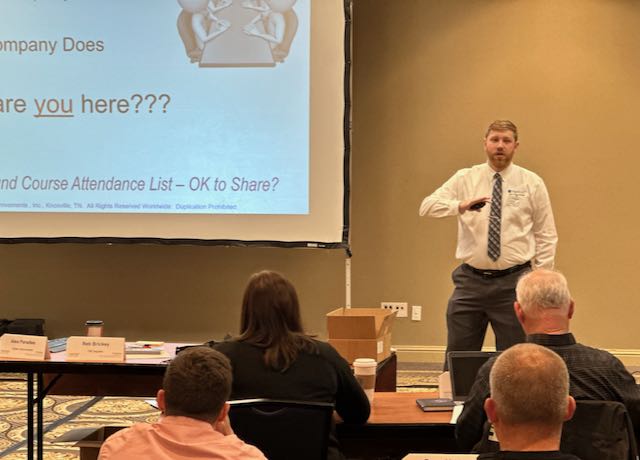The Simple Recipe To Make Anyone An Expert

I am sure you have heard the rule that it takes 10,000 hours to become an expert. This rule was popularized by Malcolm Gladwell’s book Outliers. It does take significant time to become an expert, but time alone in the task will not turn someone into an expert. You need to follow a simple 4-step recipe to become an expert.
Step 1: Find a coach. (Repeated attempts with feedback.)
Step 2: Create less complex systems for learning. (Focus on tasks with consistent variables.)
Step 3: Give feedback soon. (Know if you got the answer right or wrong quickly.)
Step 4: Push your skills (safely). (Practice at the edge of your comfort zone.)
Before I get into these 4-steps, I want to encourage you to imagine a task or skill you could apply this to. It could be personal or work-related. For this, I will be using how to become an expert in the work-related task of driving a forklift.
First, we need to address the difference between competence and expertise.
Competent – Has the basic skills necessary to perform the task successfully.
Expert – Has the advanced skills necessary for superior performance repeatably.
Here is a funny video showing the difference between a novice and an expert.
So, before becoming an expert, you must first learn the basics. That means you must get forklift certified. This usually involves some basic training and a driving test demonstrating you have the basic skills required to operate the vehicle safely. You will have a certified trainer who will teach you the basic skills and provide feedback on what you are doing wrong or right. Does a 1-hour course and a laminate forklift certificate make you an expert? No!

So to become a forklift expert what must you do?
Step 1: Find a Coach
Most companies start you with a trainer who will show you how to do the task. However, to train an expert, you need to focus the training on repeating processes with feedback. Many organizations fail to teach their trainers how to provide coaching to people. By improving the coaching skills of your trainers, you will improve the speed and proficiency with which your trainees learn.
Step 2: Create Less Complex Systems for Learning
It is challenging to become an expert in a system with a high number of uncertain variables. In TapRooT® RCA, we call these complex systems. It requires knowledge-based decisions to navigate a complex system. It is tough to safely train an expert in a system where much of the process is inconsistent. When the “right” way is never the same, how can you coach them on the “right” way to perform the task? Organizations should look to create procedures for tasks to increase consistency and make variables more visible. Here are some examples of what this would look like for the forklift task. Make it clear which direction is the right way to drive and where to drop off items. Marking what loads are safe for which type of forklift. Have items be in similar configurations and use a repeatable lifting process. All of these remove variables that a driver would have to navigate, making it more straightforward to learn the process. The more repeatable the process is, the faster it is to learn.
Step 3: Give Feedback Soon
If you watch professional athletes practice, they will run the same drill repeatedly. However, repetition is not enough to make an expert. Expertise is built on making minor adjustments to performance over time. It is knowing if you did it right each time. Football players will watch game footage to look at their decision-making. Golfers will look at recordings of their swing. When they see deficiencies, they introduce new practices to correct them. Then, check again to see if the desired change occurred.
But just getting feedback is not enough. It also needs to be timely. This means that when someone makes a mistake, they must know it as close to when it occurred. The further you are from the action, the less effective the feedback will be.
This is evident in testing. My daughter is in 1st grade and has weekly spelling tests. How soon after the test should she know if she got it right or wrong? Which of these dates would be most effective in providing feedback on her progress?
One Month? One Week? One Day? One Hour? 10 Minutes?
We know that both the month and week delays won’t work because, by the time they get the feedback, they have already lost much of the memory of the test. So that leaves us with Day, Hour, and Minutes. How long does it take to encode working memory to long-term memory?

To engage the slow-thinking cognitive process, you must interact with feedback soon after completion. So, given a short break, the brain will be ready to engage with the material again and encode the feedback into long-term memory.
So, our expert forklift training will include feedback after different lifts. Ideally, our trainer could review what actions were taken and what other possibilities we missed. In a more advanced world, you might even film someone doing the task and show it to them. Stopping to point out key positive and negative behaviors.
Step 4: Push Your Skills (Safely)
The final element you need to make an expert is to practice in the uncomfortable.
“Comfort zones: If you live in one too long… that becomes your norm.
Get comfortable being uncomfortable.” – David Goggins
If you desire to push for consistently superior performance, you will need to challenge the limits of your ability. People at the top of their field are always pushing the limits of their craft. Top performers have an extremely low tolerance for the current condition. They seek to push their limits to maximize performance. Now, that is very motivational, but is it safe?
When it comes to pushing our limits in work, there needs to be some accountability to understand how to do it safely. Pushing your limits as a forklift driver does not mean spreading around a corner on two wheels. It means continuous learning of skills that will help you deal with and prepare for uncertainty. Practice failing safely. Simulate dangerous lifts and look at the results. See which actions turn disaster into success.
Expert, What’s Next?
Now, to truly prove you are an expert Forklift driver, you must compete in the Stapler Cup in Germany.
Learning More About Applying Human Performance Best Practice
If you want to learn powerful ways to improve human performance proactively. Then, consider checking out the Stopping Human Error Course.

This course covers what human performance techniques work, the science behind them, and how you can integrate them into your programs.
Click here to find the next available public Stopping Human Error Course
To see more on this topic, check out this Veritasium video.




A good illustration and precise steps on improving safety performance as this can be applied to ensure a desirable safety performance.